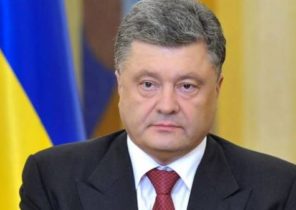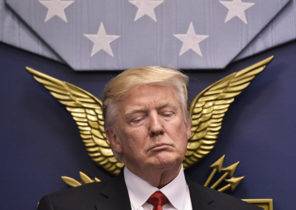
Never before in American history, the alleged foreign policy of the new administration was not shrouded in such uncertainty. This is because of the notorious “perfect storm” was the result of combining the four individual causes of uncertainty: the complete absence of Donald trump’s experience of the civil service; it focused on the present, narcissistic personality; the probability that it is still not certain and not proven state appointees will have undue influence in foreign policy/national security; and the fact that the foundations of Education of the Western States and the Westphalian state system undermines both inside and outside.
However, amid this storm, there are only three possible General outcomes of the strategy implementation: (1) the old world, that is, a fundamental continuation of the current national American liberal internationalist Grand strategy and a continuing role in the world; (2) a closed world called neoisolationism — “fortress America” in combination with unilateral, isolation in the military sphere (as necessary) and the highest possible economic autarky; and (3) a cold world, selectively active “deliberaly” strategy of balance of power based on pragmatic politics.
These three options were conceptually distinct, but in some ways they are the same. The current strategy is mainly determined by the radial structure of the US Alliance, covering the whole world, but its main purpose easier and longer than the means of its implementation — to prevent the emergence of a hegemon in peninsular Europe or East Asia. The structure of the Alliance is a means of achieving this goal, ensuring the suppression of competition in the field of security in these and adjacent areas — that is, performing a task, often referred to as a more elevated “to the provision of services to ensure global collective security.” In addition, the tonality of this strategy corresponds to the liberal or institutional internationalism formed from two elements — ideological (democracy promotion) and economic (free trade). The meaning of the more moderate aspects of the US strategy is to assume (or persistent statement — depending on the circumstances) that alliances based on principles of cooperation not only desirable but possible
As part of this national Grand strategy can be elements of departure from the policy (or adjustments) that may resemble the isolationism without disrupting strategy as a whole. (Moreover, some cases these adjustments have already been observed in the years of the Obama presidency). In particular, currently non-trivial adjustments, most likely in the field of the Department of trade and economic issues.
Similarly, when the isolationist disclaimer (if it happens) it is possible the observance of the principles of real politics based on balance of forces, which act as a secondary strategic criteria.
However, given the US influence on the formation of an international climate in any of these three possible cases (the former world, a closed world, a cold world), provided that it is clearly to characterize American policy, will create a special architecture of global security. It will affect every nation in the world. It is therefore very useful as a heuristic evaluation to analyze, at least briefly, how would look like these three architectures.
The former world
If the policies of the administration, trump will demonstrate the fundamental continuity and will be the continuation of the policy conducted over the last fifty years, it would mean that the revolutionary rhetoric trump that was played during the election campaign and which was directed against the existing state of Affairs, was either frivolous, insincere and incompetent, or was a combination of all the above. But continuity in this case does not mean that nothing will change. Even if some of the upcoming large-scale multilateral trade deals are now virtually hopeless, we should not draw conclusion that with them will put an end to the entire liberal world trade, including the WTO, the IMF and the world Bank. And if we assume that the trump will demand from the allies to produce more offsets, we must not conclude that it means the end of the very structure of the Alliance. If we assume that U.S. relations with Russia will happen again “restart”, we should not draw conclusion that US policy will give Russia freedom of action in the Ukraine, the Baltic States and beyond. We should not succumb to the hysteria on the basis of the preliminary signals; the adjustment of existing policies — in functional and geographical terms — does not necessarily mean the abolition of the old structures of the strategy as a whole. Let’s focus first on Europe and then move on to the Middle East and Asia.
Europe: if we, for example, look at the new President and his rhetoric before the inauguration, we can expect that NATO will exist still, but its role will be more modest. Sanctions imposed against Russia over Ukraine, most likely, will come to naught for several reasons. But this, in turn, means the likelihood that the Russian authorities will go to the clearly marked red lines, invading the other States to the West of its borders or destabilize them. Of course, we can not exclude mistakes. A crisis in the security of the Baltic countries will accelerate the onset of NATO the moment of truth — al or use of articles V and will resist, possibly, creating the danger of a nuclear exchange, or do not, and will actually cease to exist as a serious factor in European and global geopolitics. However, it is not very different from the political course chosen under Obama.
However, what is different from the era of Obama, and probably in the next four years will be even more is the slope of the European domestic policy to the right. If marine Le Pen becomes the next President of France (which is unlikely, but not so unrealistic), the European post-war liberal project would be a dead end and it will be jeopardized. In a sense, this Europe like Donald Trump more. Will it be as weird as it sounds, the “nationalist international”. In these circumstances, the perception of the transatlantic relationship may even improve, but it will not lead to cooperation based on institutional security policy, which has been the norm since 1949. This will be a unique Union, which might get the wrong idea. It can be unsafe, and inside it there can be negative effects.
The result of the actual decline in NATO’s relevance in the eyes of the United States against the background of ongoing nationalist and even anti-liberal roll of European politics, Germany will experience enormous stress. If during the reign of trump, the US government will continue its policy of separation from Europe (which seems quite likely in light of an interview he gave the magazine Bild before the inauguration), then the postwar role of the United States organizer and facilitator in reconciling the conflicting interests of European States is likely to go (not quite smoothly, but still will go) from Washington to Berlin. Germany will become the centre of gravity in decision-making as the largest and richest of European countries, especially now when the United Kingdom is experiencing its own multi-level crisis of identity and political order. To some extent, judging by the Euro crisis and immigration crisis, the decision-making center in Europe has already moved to Berlin.
Of course, this role reflects not only the separation of America from Europe and the weakness of Britain and unbelievable vicissitudes of French foreign policy. Foreign policy of Charles de Gaulle and his supporters was based on the ability of France to achieve political power, using the partition of Germany in Europe and the division of the world into blocs led by the superpowers. This explains the famous (though immodest) metaphor, according to which France is the rider and Germany is the horse. Hence the role of the French nuclear strike forces. After the end of the cold war and the reunification of Germany claims France was on the proverbial “dustbin of history”, which once said Trotsky.
As for the successful implementation of the French strategy for Germany is too big, and a world without the Soviet Union too Americanized, French alternatively decided to focus on the strengthening of the European Union. France who are very comfortable in the EU and monetary Union, could better serve as a counterweight to the US and deal with a more powerful Germany. A clue to the ultimate success of this new French strategy, it was the United Kingdom. To neutralize Germany, France had to act together with great Britain, and this meant, ultimately, the rapprochement of Britain, the EU and its involvement in the monetary Union. Now, when at the end of June last year, the Brits unexpectedly voted for a British exit from the EU, all of the updated strategy of France is collapsing. Monetary Union gradually disintegrates, the likelihood of the collapse of the United Kingdom (in Scotland and perhaps even Wales and Northern Ireland, each in their own will secede from the UK) over the next four years should be considered quite high. About a century ago the phrase “a supporter of the “little England”” refers to people who denounced the ambitious role of the Empire and the great powers. Today she has a whole new meaning and refers to those who came to terms with the collapse of the UK itself in the composition, which is provided for by the Act of Union, passed in 1707.
What decisions will have to be Germany when it finally leave the United States, and Anglo-French counterweight in Europe? Given that Russia and to some extent still is reborn, despite his weakness, and considering that no power controls the territory between Germany and Russia, as did the Habsburg Empire for many centuries until 1918, the only main result: Germany can become a country with advanced functions of guarantor of security in East/Central Europe, which she would have been in conflict with Russia. or it could conclude another Treaty of Rapallo — the joint rule of the area to the detriment of the countries located between them.
No one now knows what the decision of Germany, if it were to face such a dilemma because it depends on a number of not yet taken decisions, depending on different circumstances. But if Germany will face such a choice, it would mean the end of architecture of the old world, since the origins of this world are an integral part of the agreement reached in Europe after the Second world war. However, it makes sense to briefly discuss this subject, because this decision may well be intermediate between the variant of the old world and one of the two remaining closed world or cold world.
If Germany decides to be a guarantor of security, she will have to overcome huge cultural and political obstacles — and it will have to build a nuclear Arsenal. Germany has a very heavy historical baggage, after she turned down the role of the aggressor, its universally perceived as highly moral/intellectual country, and over the years of being a part of the Alliance she has forgotten how to think strategically. Moreover — and this is, without a doubt, the most important modern German democracy today is largely tied to all of these three factors and may be at risk if Germany is moving in this direction. The majority of Germans today are very intolerant about anything that contains even a hint of such actions, so still a minor alternative-right minority that wants to move in this direction, it seems so intimidating.
So it seems more likely that in the near future, most likely, expected second Rapallo Treaty. In Germany today there are many who “understand Russia”, and it seems that their number will grow as the Russian kind of nationalism are, apparently, more like the Germans, who fear that as a result of mass immigration will be destroyed by what they call the dominant culture of Germany. So eventually we may witness a virtual return “Union of three emperors” (the totality of the agreements between Germany, Russia and Austria-Hungary — approx. transl.) The nineteenth century, which was equally a socio-political conservatism and policy considerations. Except for the fact that without the Austro-Hungarian Empire that it was simply “the Union of two emperors”.
Middle East: If we believe the words of the new President, but will put forward the hypothesis of a critical traditional postwar strategy of the United States, the main focus will be on eliminating, as far as possible, the tentacles of Sunni Islamist terrorism. This can lead to a significant (maybe short, maybe not) to increase the US military presence in the Arab world — including to the input of the US army in Iraq, Syria, Libya, and possibly in other countries. These steps will not be aimed at long-term state-building or any other activities associated with the settlement of the political situation; it will be punitive actions aimed at undermining, blocking and destruction of forces, which are considered the enemy. Of course, like all such decisions involving the impact point, their side effects and consequences will be unpredictable. This approach can be effective in the destruction located in the area of possessions, objects, and defensible positions of ISIS (an organization banned in Russia — approx. ed.) — and in any case to ensure significant progress — but it can be counterproductive to overall efforts to combat terrorism.
This is because in the case of the presence of significant US forces in any Arab country (especially too long) it’s safe to expect growth of mass discontent and hostility on the basis of the prevailing memories of the Western/Christian colonial yoke. Such a presence will be the impetus for religious extremists, which, as always, will be to mobilize religious symbols to fight against the infidel invaders (as was the case in Iraq after March 2003). And such mobilization could become in the current environment in motion, a few able to overthrow weak regimes, including Jordan, Egypt (again), and even in Saudi Arabia. This, of course, will not contribute to the fight against terrorism, if the key regional partners of the U.S. will be destroyed in crossfire as a result of erroneous political decisions of Washington.
Such a policy — even without large-scale involvement of U.S. armed forces — will mean, cold-blooded escalation of tension in relations with all regional powers who share or allegedly share anti — terrorism priority, with Egypt, UAE, Jordan, Morocco, and possibly Turkey. Special attention to the development of democracy; the financing of programmes of civil society national democratic Fund will be reduced — and again, the political course is not much different from the basic priorities of the Obama administration. Trump and his Jewish supporters like Israel as a nationalist state, right-wing, so in terms of the peace process and settlement expansion there was no noticeable pressure on Israel will not. But the practical value of Israel to combat Islamist Sunni is limited. Are resolved and other painful problems — for example related to how to manage and help the Kurds, while maintaining helpful relations with Turkey. Everything will go as usual, and accompanied by a great difficulty — but without the liberal rhetoric and associated duty Paphos.
The real question mark in middle Eastern Affairs can be put in relation to Saudi Arabia. If pragmatic Donald trump is going to take Saudi Arabia through the prism of oil and the global economy, no special changes will not occur. But if trump would consider Saudi Arabia through the prism of terrorism, believing that the Saudis involved in the September 11 attacks (and, in addition, the United States due to their energy self-sufficiency is no need to worry about mutual well-being of the global economic space), the relationship can deteriorate rapidly. Especially if trump changes his mind about Iran and see it as a real ally in the fight against ISIS. It is quite possible — just as it is in the same light he sees the Russian-backed Alawite regime in Syria. The Saudis are desperate because of security problems, then you can resort to dangerous self-help options — for example, strengthening its tacit understanding with Pakistan over nuclear weapons.
It is also possible that trump will go both against Saudi Arabia and against Iran without thinking about the dynamics of neutralization of forces inherent to such decisions. In the ranks of conservative Republicans has become the symbol of the faith the view that the agreement with Iran should be abolished — early (by withdrawing the U.S. government from the agreement) or later (by means of increased pressure that may force the Iranian regime to withdraw from the agreement). It’s also possible that the agreement will fall apart — even if neither party doesn’t want — for various reasons owing to differences of opinion in the United States and the actions of Iran.
If this happens and if the Iranians resume their actions, not afraid to overcome the nuclear threshold, a countdown will start and everything will go to war. Not to who were in Iraq (combined with the literal occupation and actions on the formation of statehood), and punitive war, which will aim to stop for a few years, the activities undertaken by Iran to rise to the point of breakthrough. However, the US desire to confine this war can be unilateral. If the Iranian agreement will somehow be disrupted, the probability of large-scale military action against Iran in the next four years should be assessed at the level of more than 75% as the recovery mode from the comprehensive international sanctions that would be quite painful and could contain Iran, it is unlikely. Even two years unrestricted work Iran will be enough to Iran has passed the point of no return in the period of presidency of trump, and trump (as well as Obama) is unlikely to accept that Iran’s nuclear potential out of his control. If he hesitates, Israel will probably act alone, if it considers that the time has gone, and the other options he has left, and, as a result of this decision, the US may in any case be drawn into the war. Unpredictable consequences of such a war — no matter how it starts — will be huge.
In addition it should be remembered that within the American strategic thinking post-war middle East was added to the critical regions only from practical considerations to ensure that energy resources could help in the recovery of the economies of U.S. allies in Europe and Asia. And subsequently because he could prevent the incursions of the Soviet Union towards the Indian ocean. Because Europe and Japan have long recovered their economy, and, moreover, there is no threat of attack the Soviet army in the Persian Gulf from Afghanistan, the strategic role of the Middle East and us-Saudi bilateral relations could be lower (with the exception of anti-terrorist programs) without questioning the very American Grand strategy. And Iran could be bombed, while not undermining the primary national strategy. Again, the decision to postpone the Iranian problem in a very good term that describes what Barack Obama, it seems, wanted to do, saying that the United States has “too much invested and too much engaged” in the region.
In South Asia, the administration of the trump likely to consider Pakistan as an ally and as a country, is basically hostile and dangerous, despite the incredible act of the President, when he before the inauguration called Nawaz Sharif. Wooing India will continue — it’s for the best if it is a means of limiting the influence and even containment of China.
That the trump will do with the inherited war in Afghanistan, it is impossible to predict. Given that the Minister of defence appointed General Mattis, it is likely that trump will listen to his opinion. And what will this mean?
Mattis is not one of those who avoids the fight but he’s not stupid enough to throw money and soldiers (after what has already been spent) until you see that the result is worth it. Policy is, of course, will be reviewed. Apparently, it will take more than one month — in the same way as it happened in the revision policy early in the Obama presidency. This will probably lead to a gradual adjustment of the policy, it will give the appearance of something more significant, and these changes are likely to lead to some distant results, like the victory. It seems that the more the administration of the tramp eventually finds out about the role of Pakistan in Afghanistan, the less they will like her.
Asia: the Language of non-verbal communication during the election campaign was equally anti-Chinese and Pro-Russian. Trump seems to think China is a fraud and a liar in the trade, hit the “trepreneurial”. However, this does not mean that it will support maneuvers, showing the “supported hardware” freedom of navigation in the South China sea. And again a key figure in such decisions is likely to be the Minister of defence Mattis.
Trump has made it clear that he wants to strengthen the armed forces, and this certainly applies to the Navy of the United States. But, he seems to see it, rather, from the perspective of the Keynesian doctrine of creating jobs than geopolitics. He clearly said during the campaign that he wants to strengthen the armed forces, which will use less. Some critics accused him of lack of logic, but there is a proverb, which was known in the time of George Washington and others before him: “if you want peace, prepare for war”; and it’s not bad advice. However, this does not mean that a stronger American army means stronger U.S. alliances in Asia. It might just mean more opportunities for the manifestation of the very selective and inconsistent isolation of the US in Asia.
From this also we should not and that the administration trump really has an idea what to do with North Korea, or Philippines, or Malaysia, or Thailand, or any other country. The President forms his own idea of Asia, viewing it through the prism of the economy, not geopolitics. So he probably sees Japan as an ally and as a competitor. Guided by the principle of power and antagonism of the parties, it seems, wants to weaken, though not necessarily to terminate the U.S. alliances in the Pacific region. However, this depends on the individual case. He may look at the current leader of the Philippines and conclude that if this anti-American rabble-rouser wants to break off relations with the United States, let breaks. Trump does not apply to the number of consecutive thinkers, and, it seems, feels awkward when it comes to real conceptual thinking, so in that moment, when he tries to focus on the issue at hand, it all comes down to specific cases, emotions and personalities.
He, apparently, sees Japan as an ally-boarder, although to prove it in numbers and facts are difficult. Perhaps at some point someone explained to him how risky to be associated with the defense of Japan, without explaining the benefits. In the framework of its “nationalist international”, he probably likes what he sees in Abe — just as he likes what he sees in Putin and Erdogan. But again, if the choice is up to him alone, it all comes down to specific cases, emotions and personalities. So, if the Japanese government will begin to Express discontent with something that is related to the us bases in, say, Okinawa, trump at the time of this dispute may raise the issue of bilateral relations generally and, without hesitation, to say to the representative of Japan: “You’re fired”. In Asia, Japan could be almost facing the same choice, before what in Europe might be Germany — or become a guarantor of security, or to enter into transactions with a larger, but not necessarily like-minded countries on the Eurasian continent.
So even in a world where in order to abandon the structure of the US Alliance in favor of isolationism or a real policy of balancing the forces, the simple solutions do not accept (but only hint at those decisions, using the language of facial expressions and gestures), we can not guarantee the stability of the specific unions. Foreign partners the United States can be a dangerous situation and should proceed with caution. Again, many foreign partners of the USA in the years of the Obama presidency have learned to be cautious, but not because they believed the President is unpredictable or determined to deliberately end the era of the “American world”. It was quite predictable and, of course, gradually nullified (which, in his opinion, long overdue) that should be considered a vital U.S. interests. See what is the difference between their approaches (if they even differ).
A lonely world
On the other hand, the mere fact that the American bureaucracy maintains the appearance and the feeling that for the first four to six months after the start of the new administration, everything goes as usual (for technological reasons, as probably in most areas), does not entitle us to assume that the strategy that determines its action, is protected from serious mistakes and failures. This President was elected to change everything — especially in domestic policy, though America’s global role, too. It is not excluded that he understands this and is working in this direction together with dozens of political appointees, advisers, assistants and analysts, which is driven by the same motives.
In accordance with neoisolationism position, we must postulate that the current structure of American alliances in Europe, Asia and the middle East will cease to exist in the prescribed manner — first, obviously, de facto, and eventually explicitly. Instead of structures of alliances is likely to appear pretentious to the cooperation agreement, but in the absence of Treaty obligations before the law, every person on the planet will know what that means really.
Isolationist or neoisolationist America trump does not signify an absolute passivity. As in previous episodes that typically (though incorrectly) called isolationism, America will be on the world stage of economic activity. She, most likely, will continue to play the role of hegemon in the new world, as, in her opinion, required by its interests. It will continue to pursue immoral and vicious non-state actors involved in terrorism and sabotage, and to the extent necessary, will tend to create for this temporary alliances. But the United States for practical reasons will abandon their obligations to international organizations — UN, WTO, world Bank, IMF and others. The United States will maintain its participation only in the distant from the policies of the major functional organizations like the Bank for international settlements and Swift.
Under this waiver, an important issue will probably be the U.S. policy on the problem of proliferation of weapons of mass destruction. The Foundation of American non-proliferation policy in the framework of the Grand strategy of the US was the principle of the prohibition of competition in the field of security. The main reason for the spread of the American policy of containment as formal allies, and indirectly to other countries (a good example is Sweden), was the deterrence as motives and capacity of the state to distribute weapons. If US policy will be excluded attention and responsibility for global security issues, the U.S. policy of recent decades and no clear reasons to pay particular attention to combating the proliferation of weapons. If the United States will be less or no allies, which must be protected, then it becomes less reason for concern about the proliferation of weapons. It is possible to imagine that the trump ultimately will adopt a well-known argument of Kenneth Waltz, according to which, the more nuclear powers, the better, so as to focus sanity, you can bet on the weapon itself.
From this it follows that within the framework of neo-isolationism, the U.S. government radically reduces the list of factors that are considered vital to US interests to a much greater extent than was done during the Obama presidency. About it will know other powers and revisionist powers — big and small — will feel freer to act in accordance with its revanchist instincts. The security dilemma will spread and the security interests are intertwined; will grow global military expenditures; then will probably resume the proliferation of weapons; and increase the probability of small and not so small wars. Instead of the fan system with the United States as a Central part will be the regional unions. These alliances are not rooted in the liberal or any other principles and therefore, most likely, they will be quite fragile. Will deception, and betrayal.
Hence, apparently, it follows that in such circumstances an autocratic or authoritarian government will find a more honorable place than a democratic and pluralistic States. The state will be strengthened at the expense of nationalism is a relatively liberal or illiberal, while a weak state is the cause of that fear, which many in the elite around the world want to resist. However, strong States usually mean weak or dependent, oppressed civil society, so that the famous “third wave” of democracy will be more umenshatsya and retreat. In any case, democratic countries as a system of decision-making in geopolitics, in the General opinion, too complex and insufficiently dynamic. Therefore, although the United States can be excluded from the Eurasian geopolitics and “place” in terms of pozoleria, as a result of this exception, others will be forced to become part of a world where rules are based on the balance of forces in the real policy world is divided into separate interactive regions in which democratic governance is characterized by the fact that it is not perceived as a distinct advantage.
On the background of such trends, Japan and Germany probably as no other country in the world, will face the need to make painful choices. May be undermined the foundations of their modern identity, and the implications for their political cultures can be in the truest sense of the word is absolutely radical.
Cold world
The idea of America striving for a politics based on balance of power, surprising the Americans, the most familiar with the story, (and others) like an oxymoron. “Exceptional” America is, in the apt words of Gilbert Chesterton, is a “nation with the soul of the Church.” Never since the Mexican war the United States did not have to maneuver on the geopolitical chess Board, competing with equal or nearly equal, and never America in their concepts acted as acted mercantilist Empire of the Old world. America was a different, better, more revolutionary, more enlightened — it was the “city on the hill.”
But all this happened when I was the great spirit of the enlightenment, when there was a strong American optimism and self-esteem, and when it seemed that the strengthening of American power and the idea of progress go hand in hand towards the rapid historical events. Those days seem gone forever, so now for the first time in American history — one can actually imagine that forty years ago, it was elusive beloved brainchild of Henry Kissinger. For the fact that America may again become “great”, you can pay coin of the America that probably no longer is, and probably will never be exceptional.
If foreign policy and national security policy, the US began to resemble European or Asian state system of the nineteenth century, which operated on the principle of equilibrium of forces, the consequences would be very serious. We would go back into the world with spheres of influence, which for its geographical vastness and cultural spheres dominated by the major powers, and all the other great powers allow them to do it until then, unless there is a threat to their own interests.
Such a world would be close not Arabs and Iran; Russia, not Ukraine or Poland. Such a world would be ideal for China — as long as he remained in their great borders, not for Vietnam, Singapore, Taiwan, Korea, and possibly Japan.
As before, in such a world, there are areas of rivalry. You can imagine the juxtaposition of ambition and fighting spirit between, say, Iran and India for the trophies of defeated Pakistan. You can imagine the continuation of the Turkish-Persian wars of the previous centuries in the modern collision of the Iranian and Turkish interests. You can imagine the brutal opposition between the ambitions of regional hegemons and smaller (but not small) powers that refuse to become dependent States.
In such a world the United States can play the role of “offshore balancing of the state” in relation to the Eurasia — as called them many scientists, and that some have been calling for for several years. Those who advocate this type of strategy the United States, recognize that the conflicts and wars of the middle of the scale, perhaps, would occur with greater frequency. But they also usually argue that, given that the US is isolated from them due to previous alliances, they are no longer at risk of being drawn into a major war in which at stake their own vital interests. Often heard arguments that it’s even better — with no annoying Messianic ideologies, which break the whole process, in this world the danger of waging war for world domination will be low. In addition, it is possible that the great powers again from time to time will be able to impose solutions to the annoying problems of local and regional scale that can’t be resolved on the ground — remember the Congress of Berlin and other such conclaves of former times.
As it was after the Napoleonic wars, at least before the unification of Germany, the system of the great powers, most likely, is a consistent conservative system. To internal and regulatory changes will be frowned upon, not to let the demons of idealism. To nationalism are tolerated and treat it will be with reverence as long as its variants, going beyond the boundaries of the patience of the great powers, not overly ambitious. Small and relatively defenseless culture again will be a dead end — as well as the hope for the spread of liberal and democratic norms. The idea that liberal ideas and institutions can flourish without support, without the support of examples and the prestige of power, advocating for these ideas and standing on their defense, ultimately, is a fantasy. Economic relations between States will again become subject to the dictates under the guise of negotiations. The potential for a transnational cooperation to address common problems relating to the environment or the protection from pandemic probably will decline, which we can only speculate nervously.
The main outlines of the world which is the real policy, based on the balance of forces which will arise as a result of the collective decisions of the United States or default, easy to imagine. The hint is a large part of the diplomatic history for the period prior to 1914. Of course, the condition of the equipment of the XXI century, something changes — maybe a lot. In addition, the fact that the new social conservatism does not fit with the powerful religious influences that existed, say, in the Catholic regions of the Habsburg Empire or in Anglican Britain, raises a number of questions. From the foregoing, it is seen basis.
Again, three universal world in which we find ourselves under the leadership of the trump, are not mutually exclusive in all respects. Elements of each of them can exist in the other two. Perhaps more interesting is that over time, one world to the exclusion of the other, and then what this world can crowd out the third.
Indeed, despite the fact that the level of uncertainty is too high to be in any way sure, such shifts may well characterize the future. If trump or the administration like trump will remain in power for eight years or possibly even longer, enough time for America’s foreign policy and national security policy has shifted from the old world to a closed world, while retaining some residual signs of his old form, and from there into the cold world, with atavistic features of the two previous forms, yet only dimly discernible. In other words, we could move on from American liberal internationalist, advanced, antihegemonic a great strategy to neoisolationism a great strategy, and then under the influence of topical issues (imagine that you can easily) move to a strategy of real policy based on the balance of power, which in the present situation will not last, and only refuge. This is the most likely scenario.
Is this good or bad? At this point in the relationship presented in this paper is essentially analytical reasoning there were no criticisms of moral or legal nature. But now allow me to digress.
The liberal elite world, at least in the West, to blame for the fact that in recent years had disrupted the implementation of the liberal project, by interfering with their utopian aspirations, which for most communities of the country was a daunting task. It is not a sin, and the person does not need to condemn because he wants to live with people who can support mutual expectations of behavior of another as individuals and as families, because they are in the process of becoming shared by a culture over generations. Not a sin to believe (in spite of whether the facts, or because of them — not the point) neotnositsya in the existence of good and evil, and even God. Companies, which are characterized by such beliefs often demonstrate a high level of social trust and high levels of social trust contributes, ceteris paribus, cooperation, generosity, prosperity, and other recognized advantages. Therefore, it is not a sin to take care of their neighbors and countrymen more than some imaginary average versatile person. In addition, it is to such qualities as dignity, despite their differences, and compassion for refugees.
Possibly it would be reasonable to restore the policy, prior to the formation of identity, botopasi liberal nationalism. It is a cultural Foundation that can become better support for non-adversarial based on the concept of active, internationalist US foreign policy and national security policy, which ultimately was good for America and for the world. Restored American liberal nationalism on the basis of which patient approach and with the assistance of like-minded people, you can create liberal internationalism — as he gradually and painstakingly built up over many years, since 1945 — far more preferable to achieve the elusive globalist utopia (or dystopia), and far preferable to return to an antagonistic non-liberal way of thinking and acting.
Is it possible? In theory, Yes. Otherwise I’m afraid we are lost.







